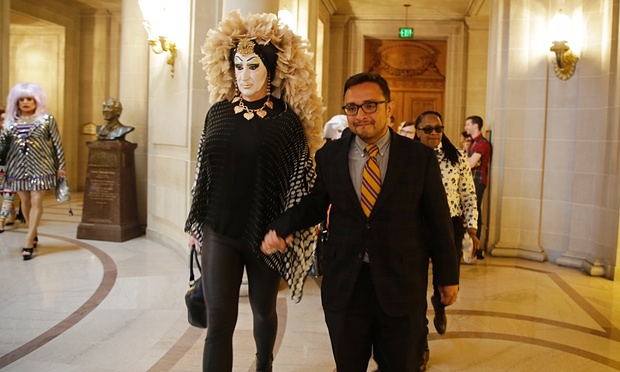Victory for drag queens as Facebook apologises for ‘real-name’ policy
-
Drag queens win right to go by preferred names
• Lil Miss Hot Mess: ‘I’m beyond thrilled’

San Francisco supervisor David Campos, right, walks with Sister Roma after a meeting in his office with drag queens last month. Photograph: Eric Risberg/AP
Facebook apologized to drag queens on Wednesday following a meeting with community members and queens who protested against the company’s order to use their legal names on the social networking site.
Facebook’s chief product officer, Chris Cox, said: “I want to apologise to the affected community of drag queens, drag kings, transgender, and extensive community of our friends, neighbours, and members of the LGBT community for the hardship that we’ve put you through in dealing with your Facebook accounts over the past few weeks.”
Drag queens challenged the social media giant in September after several received emails telling them that they must change their profiles to their “real names”.
Cox said one Facebook user reported several hundred accounts as fake, which prompted their incorporation into the company’s weekly fake names report. He said that 99% of the accounts that make that report are “bad actors doing bad things” like impersonating and bullying, and said nobody at Facebook had noticed the pattern of one person reporting specific types of accounts.
He said the policy has never required everyone on Facebook to use their legal name and that the company is building better tools to authenticate accounts for users who prefer not to, like drag queens. He also said Facebook is working to require better customer service for people whose accounts are flagged, which was one of the key demands made by the drag queens and their supporters.
“The spirit of our policy is that everyone on Facebook uses the authentic name they use in real life. For Sister Roma, that’s Sister Roma. For Lil Miss Hot Mess, that’s Lil Miss Hot Mess,” said Cox. “Part of what’s been so difficult about this conversation is that we support both of these individuals, and so many others affected by this, completely and utterly in how they use Facebook.”
Cox reaffirmed that the “real-name” policy is meant to differentiate from other parts of the internet that accept anonymity and to protect people from trolls and abuse conducted by those protected by anonymity.
Wednesday’s meeting was the second between Facebook and the drag queen group, which also included San Francisco supervisor David Campos and other community members. They had condemned the company for asking them to use their “real names”, arguing that the policy is also unfair to transgender people, victims of domestic violence and political dissidents.
“It takes a lot to impress a drag queen, but I’m beyond thrilled that Facebook has offered a genuine apology and agreed that our real names are the ones we make for ourselves,” said Lil Miss Hot Mess in an email to the Guardian. “This is a huge victory not only for us queens, but also for the countless others we’ve met along the way whose names don’t always match their ID cards, but allow them to express themselves with less fear and more fabulousness.”
When the complaints were first brought to Facebook’s attention, the company encouraged people to consider creating fan pages under their preferred names or writing an alias under their profile name.
As discussions between the parties wore on, some performers closed their accounts while others changed their accounts to their “real names” and changed their profile pictures to purple squares with: “#mynameis” written across as a mark of protest.
Organisers had asked queens and performers to gather at San Francisco’s city hall “in face” on Thursday for a rally against the policy. Before the meeting concluded on Wednesday, Lil Miss Hot Mess said the rally was still set to occur.
More than 36,100 people have signed a petition asking Facebook to change its policy to allow performers to use their names on their personal accounts.
